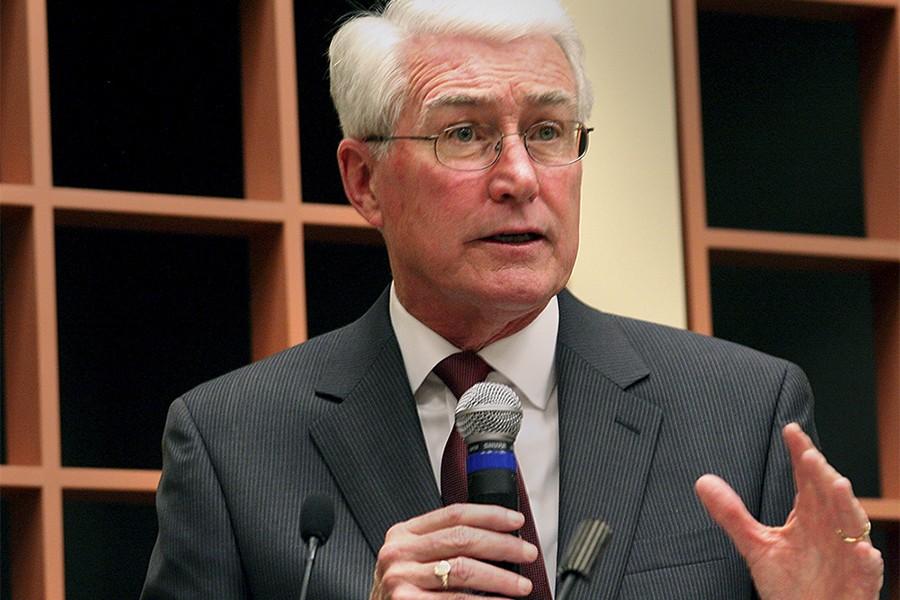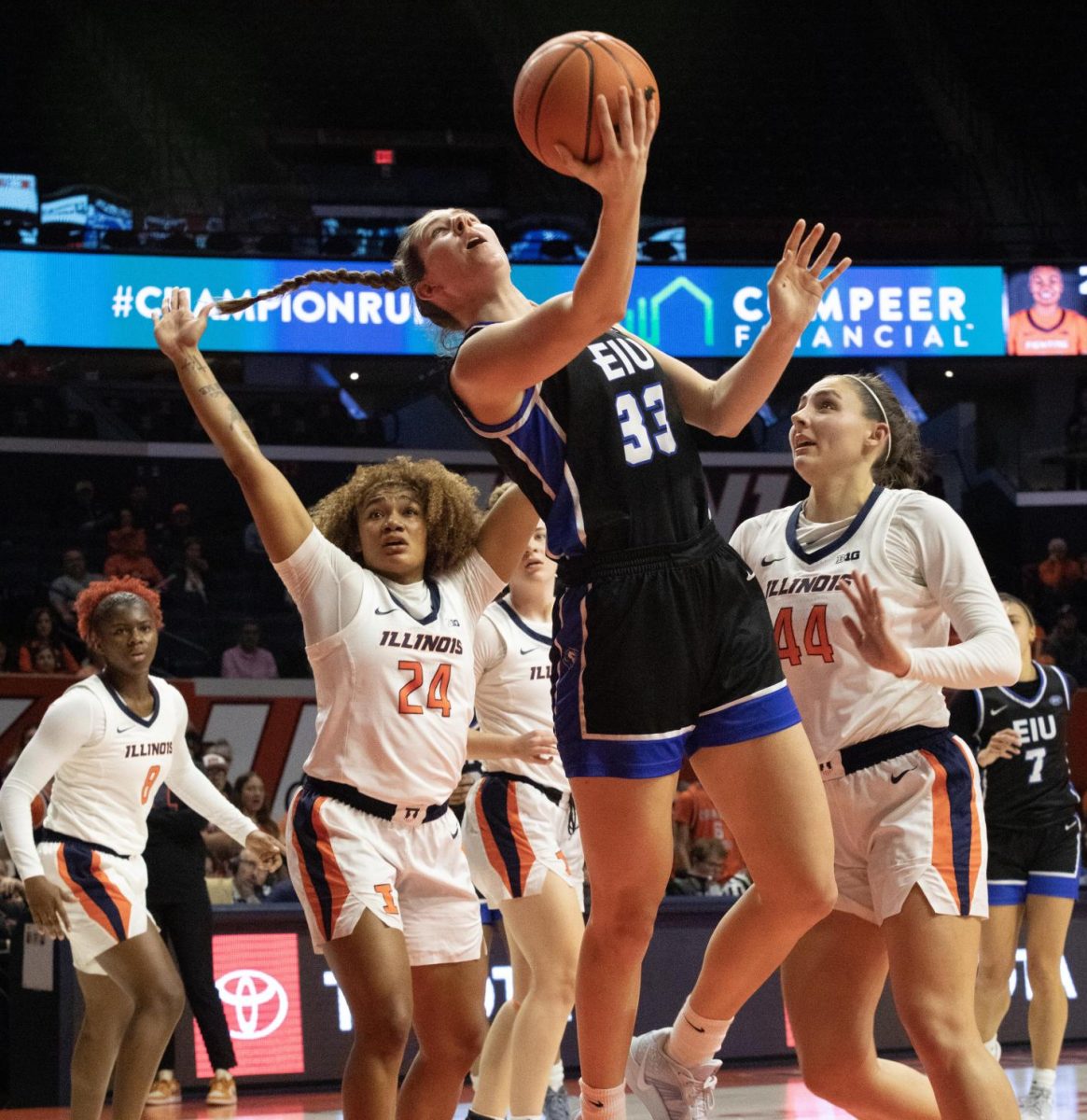Proposal for adding foreign language requirement hours under review
A requirement that would add four more hours of foreign language study is being reviewed after two administrators suggested it needed a closer look.
The Council on Academic Affairs is reviewing the new foreign language requirement at the request of President Bill Perry and Blair Lord, provost and vice president for Academic Affairs.
An ad hoc committee was formed at CAA’s Sept. 4 meeting to review the requirement that it passed April 17, with changes to go into effect in the Fall 2010 semester.
Proposals, once passed by the CAA, are sent on to the provost and president for final approval.
Perry sent a letter to the council on April 28 stating the proposed changes needed to have more consideration.
A subsequent letter from Lord on April 30 delved deeper into their concerns. First, he said the change would be significant for the university especially because it would make Eastern unique among all Illinois public universities.
“Unique can be very good and there is certainly nothing wrong with aspiring for higher levels of attainment in language skills or other academic disciplines; however, we must be attentive to the secondary effects and unintended consequences of any change of this magnitude,” Lord said in the letter. He then addressed the issues this change would raise.
The letter stated that data from 2006 indicated 55 percent of new freshmen and 73 percent of new transfers would not meet the new requirement, which would amount to 1,763 students who would need at least one additional foreign language course.
“One year data is not sufficient, of course, on which to base decisions,” Lord said in the letter. “In time, students alert to the change may complete three years of foreign language in high school. However, these data suggest more study is needed.”
Last spring, Stephen Canfield, chair of the department of foreign languages, proposed that Eastern change the foreign language graduation requirement so that to achieve a bachelor’s degree a student must successfully complete three semesters of a single foreign language with an average grade of C or better.
The requirement currently calls for students to successfully complete two courses in a single foreign language.
Three years of a high school foreign language could substitute the new requirement just as two years of a high school language substitutes the current requirement.
Lord also addressed concerns over the one-third of new transfer students who come to Eastern each year and how this would affect them.
“I do think it would negatively affect our transfer student population,” said Rita Pearson, assistant director of admissions and transfer coordinator. She said Eastern’s foreign language courses are four semester hours each. Three courses comprise 12 hours, which equates to an additional semester.
“(Students and parents) see that as extra money, extra time and in the way our world is right now and economy, they would not choose Eastern,” Pearson said.
She also said foreign language may not even be an option at some students’ high schools or community colleges.
She said the concepts and rationale behind the proposal are strong, but she is sure the proposal would deter students from coming to Eastern.
“If that goes into place, I think that they will choose to go elsewhere,” Pearson said. “If they come here, I think they will try to struggle through it, but it will affect probably their completion rate.”
Lord also asked CAA to look at how this graduation requirement change might affect the different degree programs, diversity on campus, students who might have difficulty taking three foreign language courses and see what other alternatives there are to this new requirement.
“So there is some concern in that respect, with an afternoon of discussion, have the faculty of CAA really considered all the ramifications of this issue?” said Kathleen Bower, chair of CAA.
Fact-finding
In response to the concerns, Bower said CAA decided to form a committee to find facts for the council.
CAA members from each of the four colleges are represented in the committee, as well as a student representative and an academic advising representative.
The ad hoc committee consists of Darren Hendrickson of the College of Sciences, Les Hyder of the College of Arts and Humanities, Lucia Schroeder of the College of Education and Professional Studies, Larry White of the Lumpkin College of Business and Applied Sciences, Alison Kostelich as student representative, and Lora Green as academic advising representative.
“Then since they’re going to be fact-finding, we (CAA) talked about all the people they need to go out – all the groups they need to go out and ask, ‘How does this affect the students, the faculty, the budget, the groups, the learning of our students?'” Bower said.
CAA provided the committee with a list of people and groups to consult that includes: Canfield; Pearson; the School of Continuing Education; the Admissions Office; the associate deans; the college curriculum committee and Faculty Senate.
Bower said the committee would talk to associate deans who do the budget to see if this will affect the budget because she said new faculty will be needed to teach these new courses.
“They’re going to talk to the college curriculum committee and see if that’s going to have an adverse affect on our student graduation and how long students will have to stay at the school,” she said “They’re going to go talk to the Faculty Senate to see what other faculty think of this.”
The committee will report on their findings to CAA by Nov. 6.
Once all of CAA has the facts, they will decide how to distribute their findings to the entire college and then see how they want to deal with the proposal.
“At this point, it’s sitting in limbo,” Bower said. “There is a possibility it will go forward at three foreign language courses as a requirement or it may go back to two foreign language courses as a requirement. Certainly, it’s always a good idea to look at a controversial issue again and find out more information.”
Global thinking
Rationale behind the proposal from Canfield includes a desire to increase enrollment in upper division foreign language courses, strengthen the campus-wide push to internationalize the curriculum, increase participation in study abroad programs and follow the conclusion of Eastern’s mission statement which is “to reason and to communicate clearly so as to become responsible citizens of a diverse world,” according to Canfield’s proposal sent to CAA in the spring.
“I want it because I think it’s a good thing academically,” Canfield said. “I think learning a language and learning more of a language than what our current requirement is, is sound in terms of a liberal education. Also, there’s a certain practicality involved here that we live in a world where lots of languages are spoken.”
Canfield said the two-semester requirement is a good requirement in that it gets students going, but a third semester would help the proficiency level of the students.
“I like to tell students that learning a foreign language never closes off opportunities, but not having developed a proficiency in another language limits opportunities for you,” Canfield said.
He added foreign language study and proficiency is a wonderful complement to almost any major.
Wendy Williamson, director of the office of Study Abroad, said the foreign language requirement is an important component for any higher education institution to internationalize its campus.
“In my view, the higher the requirement, the more serious the institution is about international education,” she said.
Williamson said one of Perry’s goals at Eastern is to enhance study abroad.
“In order to get more students abroad, we have to get them thinking about and interested in other languages and cultures, and we can only do that through language and culture learning,” she said. “If we don’t have a strong foreign language requirement, then we can’t really stand behind the view that foreign languages and cultures are important, or critical to an increasingly global environment.”
Emily Zulz can be reached at 581-7942 or at eazulz@eiu.edu.


































































